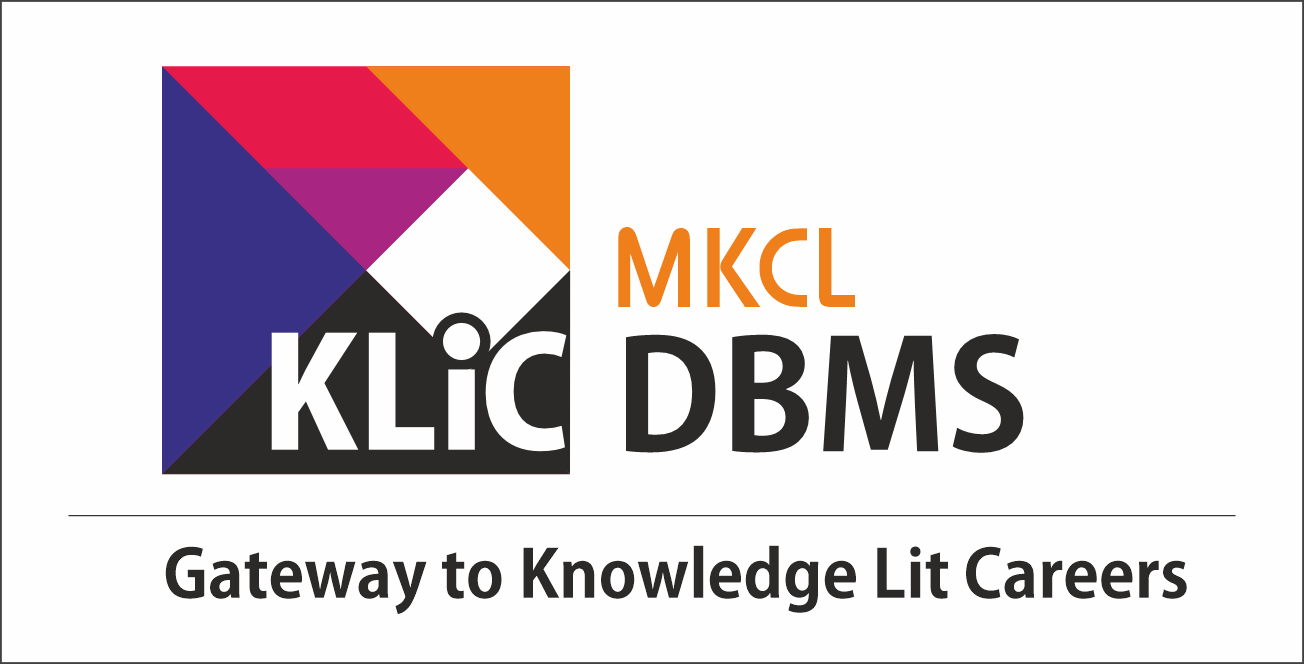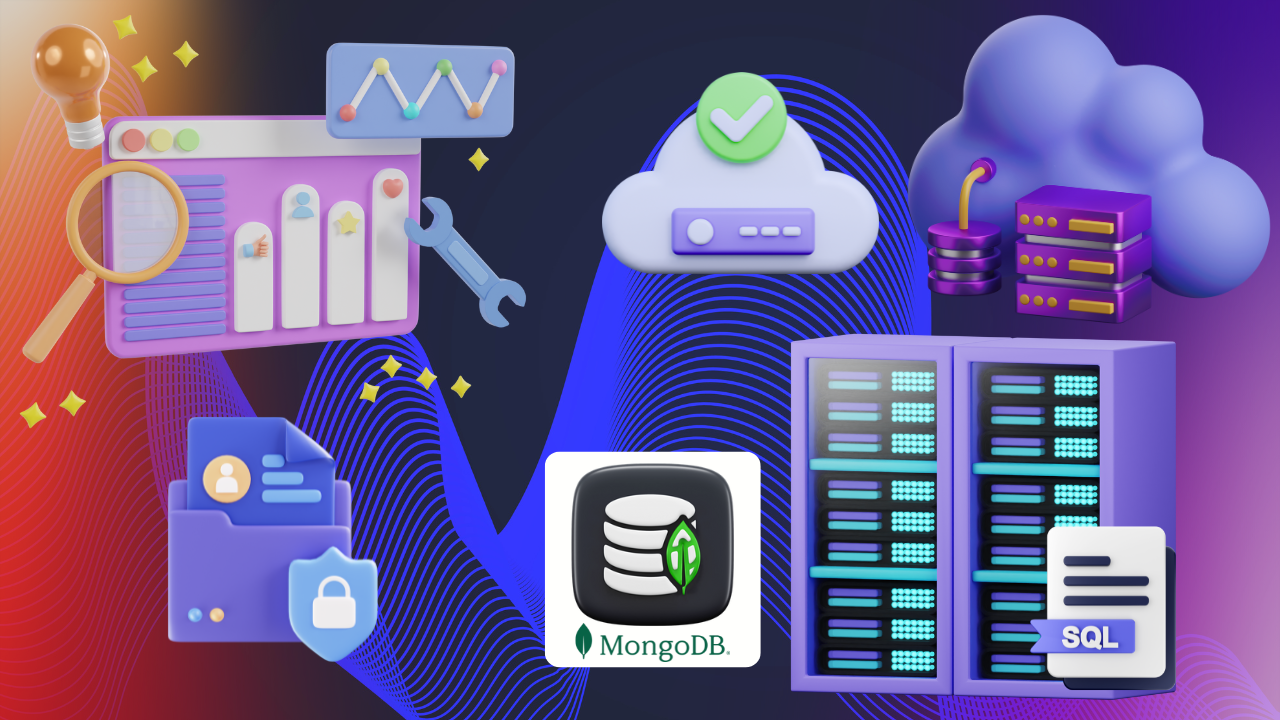- To introduce the procedural extension of SQL (PL/SQL) and train students to write modular and reusable blocks of code.
- To enable the use of triggers, assertions, and stored procedures for automated integrity and business rule enforcement.
- To integrate Java applications with relational databases using JDBC, SQLJ, and dynamic SQL techniques.
- To strengthen understanding of data design principles, normalization, and functional dependencies for eliminating redundancy.
- To provide the foundation and practice for transaction management, concurrency control, and database recovery strategies.
- To teach how to implement ACID properties, analyze schedule serializability, and maintain data consistency in multi-user environments.

Database Systems Management and Transaction Processing
Learn to handle transactions, concurrency control, and recovery in database systems.
KLiC Certificate in Database Systems Management and Transaction Processing
Introduction
What you'll learn ?
- Construct and execute PL/SQL blocks, aggregate queries, and parameterized procedures.
- Create and manage database triggers, handle cursors, and apply dynamic SQL effectively.
- Implement JDBC-based applications for data connectivity, manipulation, and metadata access.
- Identify and resolve data anomalies, and design well-structured schemas using 1NF to 5NF and Boyce-Codd Normal Form (BCNF).
- Apply normalization algorithms, dependency preservation, and lossless join techniques in schema design.
- Analyze and implement transaction properties, including commit points, system logs, and concurrency protocols.
- Design recovery and transaction processing systems with an emphasis on real-world TPS models.
- Evaluate transaction schedules for conflict serializability, recoverability, and consistency assurance.
Syllabus
- Write a PL/SQL Block of code
- Introduction to Triggers in SQL_1
- Assertions vs Triggers
- Views in SQL
- The DROP Command
- The ALTER Command
- List Data Definition Languages (DDL) Commands of Base Table and View
- List Data Manipulation Language (DML) Of Base Tables and Views
- SQL Query Using Grouping Functions
- Insert, Delete and Update Triggers
- Database Trigger on Library Table
- Accessing Databases from Applications
- Cursors
- Introduction to JDBC
- JDBC Classes and Interfaces
- JDBC Driver Management
- Connections
- Executing SQL Statements
- Result Sets
- Matching Java and SQL Data Types
- Exceptions and Warnings
- Examining Database Metadata
- SQL in Java (SQLJ)
- Stored procedures
- SQL/PSM
- Write a SQL block
- Introduction and Objectives to DB Design
- Informal Design Guidelines for Relation Schema
- Redundant Information in Tuples and Update Anomalies
- Generation of Spurious Tuples
- Functional Dependencies - Definition and Diagrammatic Notations
- Normal Forms based on Primary Keys
- Boyce-Codd Normal Form
- Multivalued Dependency and Fourth Normal Form
- Join Dependencies and Fifth Normal Form
- Inference Rules, Equivalence and Minimal Cover
- Inference Rules for Functional Dependencies
- Equivalence of Sets of Functional Dependencies
- Properties of Relational Decompositions
- Algorithms for Relational Database Schema Design
- Nulls, Dangling Tuples and Alternative Relational Designs
- Inclusion and Template Dependencies
- Functional Dependencies Based on Arithmetic Functions and Procedures
- Domain-Key Normal Form
- Features and Types of Transaction Processing
- Single-User vs Multiuser Systems
- Transactions, Database Items, Read and Write Operations and DBMS Buffers
- Transaction and System Concepts
- ACID Properties
- Commit Point of a Transaction
- DBMS Specific Buffer Replacement Policies
- Characterizing Schedules Based on Recoverability & Serializability
Certificate
- MKCL provides certificate (for 30/60/90 hours courses) to the KLiC learner after his/her successful course completion.
Academic Approach
The Academic Approach of the course focuses on the “work centric” education i.e. begin with work (and not from a book !), derive knowledge from work and apply that knowledge to make the work more wholesome, useful and delightful. The ultimate objective is to empower the Learner to engage in socially useful and productive work. It aims at leading the learner to his/her rewarding career as well as development of the society.
Learning methodology
- Learners are given an overview of the course and its connection to life and work.
- Learners are then exposed to the specific tool(s) used in the course through the various real-life applications of the tool(s).
- Learners are then acquainted with the careers and the hierarchy of roles they can perform at workplaces after attaining increasing levels of mastery over the tool(s).
- Learners are then acquainted with the architecture of the tool or Tool Map so as to appreciate various parts of the tool, their functions and their inter-relations.
- Learners are then exposed to simple application development methodology by using the tool at the beginner’s level
- Learners then perform the differential skills related to the use of the tool to improve the given ready-made outputs.
- Learners are then engaged in appreciation of real-life case studies developed by the experts.
- Learners are then encouraged to proceed from appreciation to imitation of the experts.
- After imitation experience, they are required to improve the expert’s outputs so that they proceed from mere imitation to emulation.
- Finally, they develop the integral skills involving optimal methods and best practices to produce useful outputs right from scratch, publish them in their ePortfolio and thereby proceed from emulation to self-expression.
Evaluation Pattern
Evaluation Pattern of KLiC Courses consists of 4 Sections as per below table:
| Section No. | Section Name | Total Marks | Minimum Passing Marks |
|---|---|---|---|
| 1 | Learning Progression | 25 | 10 |
| 2 | Internal Assessment | 25 | 10 |
| 3 | Final Online Examination | 50 | 20 |
| Total | 100 | 40 | |
| 4 | SUPWs (Socially Useful and Productive Work in form of Assignments) | 5 Assignments | 2 Assignments to be Completed & Uploaded |
MKCL’s KLiC Certificate will be provided to the learner who will satisfy the below criteria:
- Learners who have successfully completed above mentioned 3 Sections i.e. Section 1, Section 2 and Section 3
- Additionally, learner should have completed Section 4 (i.e. Section 4 will comprise of SUPWs i.e. Socially Useful and Productive Work in form of Assignments)
- Learner has to complete and upload minimum 2 out of 5 Assignments
Courses Fee Structure from 01 July, 2025 Onwards
KLiC 30 hour course fee applicable from 01 July, 2025 all over Maharashtra| KLiC Course Duration | MFO: MKCL Share (Including 18% GST) |
ALC Share (Service Charges to be collected by ALC) |
|---|---|---|
| 30 hours | Rs. 300/- | Rs. 1,500/- |
Important Points:
* Above mentioned fee is applicable for all Modes of KLiC Courses offered at Authorised Learning Center (ALC) and at Satellite Center
* Total fee is including of Course fees, Examination fees and Certification fees
* MKCL reserves the right to modify the Fee anytime without any prior notice
* Above mentioned fee is applicable for all Modes of KLiC Courses offered at Authorised Learning Center (ALC) and at Satellite Center
* Total fee is including of Course fees, Examination fees and Certification fees
* MKCL reserves the right to modify the Fee anytime without any prior notice
